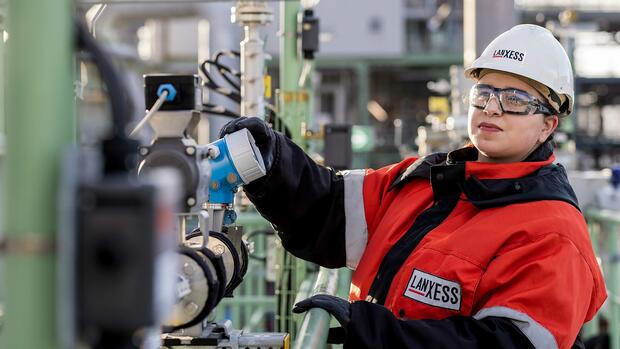Dusseldorf The weak situation of the world economy leads to the first profit warnings from German companies for the current year. The chemical manufacturer Lanxess has now surprisingly lowered its forecast for 2023. The Cologne group assumes that profits could be 30 percent below previous expectations.
The announcement shocked the stock market on Tuesday. The Lanxess share collapsed by up to 17 percent to EUR 26.14 and dragged the other chemical stocks down with it.
Contrary to what Lanxess management had hoped for in April, the global economic situation did not improve in the second quarter. This should also affect other large chemical companies, such as BASF and Evonik. Both companies declined to comment on the current business situation on Tuesday. According to financial circles, however, BASF is also talking to investors about weak development in the second quarter.
Industry expert Markus Mayer from Baader Bank assumes that the situation will lead to further profit warnings from German and European companies in the coming weeks. Most recently, the British specialty chemicals manufacturer Croda significantly lowered its forecast for 2023.
The German laboratory supplier Sartorius and the fertilizer manufacturer K+S also surprised the markets with profit warnings, which in some cases led to double-digit slumps in share prices. The reasons are complex, but companies are consistently feeling surprisingly sluggish demand in the major regions of the world and falling prices.
>> Read about this: Investors punish Sartorius after profit warning – price collapses
“The revival in demand that we expected for the second half of the year is not yet foreseeable at this point in time – neither in China nor in other markets that are important to us,” said Lanxess boss Matthias Zachert. This particularly affects Germany with its high energy prices. “In times of global demand weakness, Germany is simply not competitive.”
Chemical industry senses reluctance on the part of customers
Chemical companies had been counting on a gradual improvement in orders over the course of the second quarter. In the first few months of the year, customers from the processing industry held back and initially reduced their inventories.
However, this development continued in the second quarter and even intensified in some cases. The British Croda Group is feeling an undiminished reluctance in the business with additives for cosmetics and cleaning agents and even with pharmaceutical chemicals.
Lanxess also speaks of weak demand, even for otherwise stable consumer-related products, which is leading to reduced plant utilization. No recovery is evident for the month of June.
If demand does not pick up, Lanxess now expects adjusted earnings (EBITDA before special items) of EUR 600 to 650 million this year. So far, the forecast was 850 to 950 million euros.
The company believes earnings could be 30 percent below previous expectations.
Lanxess’ sharp reduction in the forecast for profit is also remarkable because the group expects significantly lower costs in the second half of the year, for example for gas and raw materials. However, this relief is likely to be more than offset by falling prices as a result of lower sales volumes.
The assessments of the chemical companies underscore that the mood among consumers has not yet improved again, and people are holding back on purchases in view of the burdens caused by inflation. Added to this are the problems in the construction industry, which is one of the major customers of chemical manufacturers. Several research institutes have recently lowered their forecast for the German economy.
Hopes for China have not been fulfilled so far
However, the chemical industry’s expectations were not primarily focused on European business. Rather, companies are counting on a rapid improvement in China after the end of the lockdowns. However, this hope has proven to be deceptive in the course of the year so far.
“The recovery of the Chinese economy after abandoning the zero-Covid policy is moderate,” writes the Institute for the World Economy (IfW) in its new forecast. “Falling real estate prices and the financial problems of numerous real estate developers have not only dampened construction activity, but also had a negative impact on consumer spending.”
The Chinese keep the money together, too. Travel and other services are heavily booked in the country, while sales of electronics, furniture and cars are sluggish.
This affects German chemical and plastics manufacturers in two ways: They produce in China for the local market and in Germany for the export economy. Their exports to the People’s Republic fell by almost eleven percent in the first four months of 2023.
When presenting the figures for the first quarter in April, BASF stated that it was not expecting too much from the second quarter, but was expecting a noticeable improvement in China in the second half of the year. The Ludwigshafen group assumes that the government in Beijing will stimulate the economy. There are first signs of this: The Chinese central bank has now lowered an important interest rate for companies for the first time in order to promote investments.
According to earlier information, BASF expects to achieve an operating result of between 4.8 and 5.4 billion euros this year, which would be 30 percent less than in 2022. According to previous forecasts, the Essen-based specialty chemicals manufacturer Evonik expects at the lower end of the beginning of the year mentioned Ebitda range between 2.1 and 2.4 billion euros to land. That would be a 12 percent drop.
More: Systemically relevant or dispensable? What threatens the economy if basic chemicals migrate.
